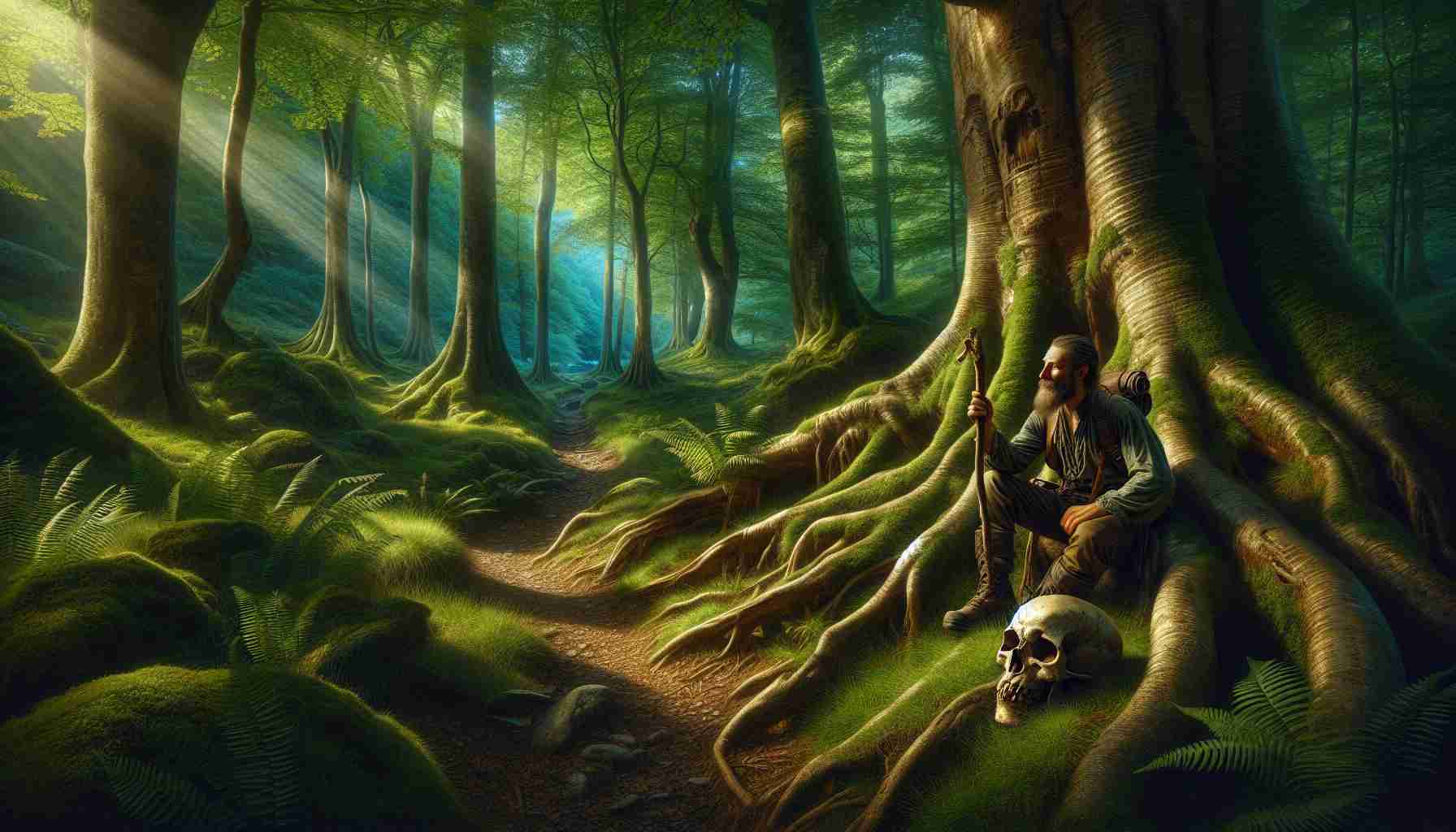

The wind rustled through the tall grass as I walked the quiet path, my walking stick tapping softly on the dirt. I was just a traveler—no great scholar, no powerful man. But that afternoon in the forest, I saw something that changed how I understood life.
It had been a long journey, and my legs were tired. The sun hovered low, painting the sky with orange and gold. I looked for a place to rest and found a tree with wide roots curling like fingers into the earth. I sat down with a sigh, leaning back, enjoying the breeze. Then, just beside me, I saw it—a skull. A human skull, resting quietly in the grass, its empty eyes staring at nothing.
I froze, then scooted back a little. My heart beat fast, but the skull didn’t seem scary. It looked calm, somehow.
“Who were you?” I asked out loud, even though I knew it couldn’t answer. “Were you a farmer?” I paused. “Or a king?” Still no answer. But something inside me felt curious—wondering what this skull had seen and if it knew something I didn’t.
That night, as I slept beneath the tree, I dreamed. In the dream, the skull floated up and smiled at me—not with a mouth, of course, but with a peaceful stillness.
“Why do you walk so far?” the skull asked me.
“I’m searching,” I replied. “I want to understand how to live well, how to be free.”
The skull seemed to laugh gently. “When I was alive, I worked hard. I chased after titles. I worried about rules, rewards, and punishment. I was always in a rush.”
“What happened?” I asked.
“When I died,” the skull said, “I found peace. All the running, all the rushing… it ended. And in the stillness, I finally saw clearly.”
I sat quietly in the dream, unsure what to say.
“But you’re not dead,” the skull said. “You still have time. You do not need to rush. Let go. Live with the flow, like a leaf floating in the river.”
When I awoke the next morning, the skull was still there, quiet as ever. But I felt different inside.
I stood up, brushed off my robe, and looked around. Everything looked brighter. The breeze felt cooler. The path ahead was just the same—but now, I didn’t feel lost. I didn’t feel like I had to run.
That day, I learned something deep and quiet. Even though the skull didn’t truly speak, its presence reminded me that life is short, and peace doesn’t come from chasing things. Peace comes from letting go, from living simply and naturally.
Since then, I’ve walked slower. I listen more. I try to live like the river—steady, soft, but full of life. And sometimes, when the wind is gentle and the forest is still, I remember the skull and smile.
My journey isn’t over. But now, I walk with the Tao—and that has made all the difference.
The wind rustled through the tall grass as I walked the quiet path, my walking stick tapping softly on the dirt. I was just a traveler—no great scholar, no powerful man. But that afternoon in the forest, I saw something that changed how I understood life.
It had been a long journey, and my legs were tired. The sun hovered low, painting the sky with orange and gold. I looked for a place to rest and found a tree with wide roots curling like fingers into the earth. I sat down with a sigh, leaning back, enjoying the breeze. Then, just beside me, I saw it—a skull. A human skull, resting quietly in the grass, its empty eyes staring at nothing.
I froze, then scooted back a little. My heart beat fast, but the skull didn’t seem scary. It looked calm, somehow.
“Who were you?” I asked out loud, even though I knew it couldn’t answer. “Were you a farmer?” I paused. “Or a king?” Still no answer. But something inside me felt curious—wondering what this skull had seen and if it knew something I didn’t.
That night, as I slept beneath the tree, I dreamed. In the dream, the skull floated up and smiled at me—not with a mouth, of course, but with a peaceful stillness.
“Why do you walk so far?” the skull asked me.
“I’m searching,” I replied. “I want to understand how to live well, how to be free.”
The skull seemed to laugh gently. “When I was alive, I worked hard. I chased after titles. I worried about rules, rewards, and punishment. I was always in a rush.”
“What happened?” I asked.
“When I died,” the skull said, “I found peace. All the running, all the rushing… it ended. And in the stillness, I finally saw clearly.”
I sat quietly in the dream, unsure what to say.
“But you’re not dead,” the skull said. “You still have time. You do not need to rush. Let go. Live with the flow, like a leaf floating in the river.”
When I awoke the next morning, the skull was still there, quiet as ever. But I felt different inside.
I stood up, brushed off my robe, and looked around. Everything looked brighter. The breeze felt cooler. The path ahead was just the same—but now, I didn’t feel lost. I didn’t feel like I had to run.
That day, I learned something deep and quiet. Even though the skull didn’t truly speak, its presence reminded me that life is short, and peace doesn’t come from chasing things. Peace comes from letting go, from living simply and naturally.
Since then, I’ve walked slower. I listen more. I try to live like the river—steady, soft, but full of life. And sometimes, when the wind is gentle and the forest is still, I remember the skull and smile.
My journey isn’t over. But now, I walk with the Tao—and that has made all the difference.